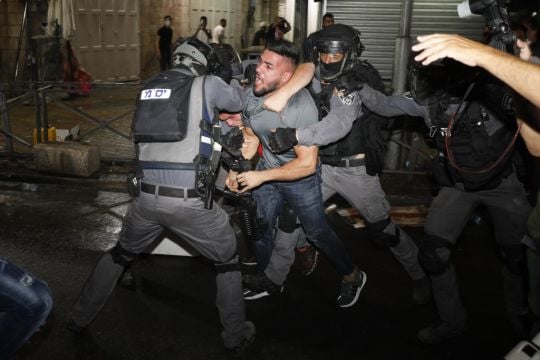At least 180 Palestinians have been injured in clashes with Israeli police at a Jerusalem holy site, Palestinian medics said, with 80 taken to hospital.
It came as police fired tear gas and stun grenades, some of them landing in the Al-Aqsa Mosque.
Israeli police said Palestinians had hurled stones, chairs and other objects at officers and onto an adjoining road near the Western Wall, where thousands of Israeli Jews had gathered to pray.
Amateur video footage posted on social media showed police stun grenades and tear gas inside the Al-Aqsa Mosque during skirmishes between officers and Palestinian protesters.

In a statement, police alleged extremists were behind the violence and said they would “not allow extremists to harm the safety and security of the public”.
The latest violence at the mosque compound came after days of mounting tensions between Palestinians and Israeli authorities in the Old City of Jerusalem, the emotional ground zero of the conflict.
Hundreds of Palestinians and about two dozen police officers have been hurt over the past few days amid the worst religious unrest in years.
The holy site, known to Jews as the Temple Mount and to Muslims as the Noble Sanctuary, is considered the holiest site in Judaism and the third holiest in Islam.
The compound is the epicentre of the conflict and has been the trigger for rounds of Israel-Palestinian violence in the past.

The UN Security Council has scheduled closed consultations on the soaring tensions in Jerusalem. Diplomats said the meeting was requested by Tunisia, the Arab representative on the council.
Earlier, police barred Jews from visiting the Al-Aqsa compound on Monday, which Israelis mark as Jerusalem Day with a flag-waving parade through the Old City and its Muslim Quarter. The marchers celebrate Israel’s capture and annexation of east Jerusalem in 1967.
The police decision to ban Jewish visitors temporarily from the holy site came hours before the start of the Jerusalem Day march which is widely perceived by Palestinians as a provocative display of Jewish hegemony over the contested city.
Police have allowed the parade to take place despite growing concerns that it could further inflame the tension.
This year the march coincides with the Muslim holy month of Ramadan, a time of heightened religious sensitivities.







